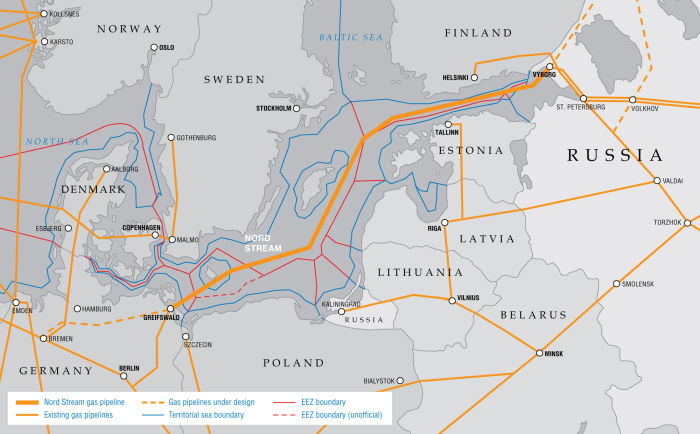Ukrainian gas transit system operator GTSOU and gas provider Naftogaz ask German Federal Ministry for Economic Affairs and Climate Action and the German Regulatory Authority, the Bundesnetzagentur (“BNetzA”), to revoke the existing legal exemptions for Nord Stream 1 (“NS1”). According to GTSOU and Naftogaz, the rationale for granting NS1 exemptions is no longer valid and NS1 should meet the same legal criteria as other energy infrastructure in the EU.
On 27 May 2022 LLC Gas Transmission System Operator of Ukraine (“GTSOU”) and National Joint Stock Company “Naftogaz of Ukraine” (“Naftogaz”) submitted requests to the Federal Ministry for Economic Affairs and Climate Action of Germany and Bundesnetzagentur (“BNetzA”), asking that BNetzA reconsiders its decision of 20 May 2020, pursuant to which the gas interconnector Nord Stream 1 (“NS1”) was granted a derogation from the application of German (and EU) energy regulation requiring unbundling, transparent tariffs and third party access for a period of 20 years with effect from 12 December 2019.
The derogation was granted to the operator of Nord Stream 1 based on the assumptions that the gas pipeline would strengthen the security of gas supply in Europe, increase market competitiveness, and ensure energy solidarity. However, these assumptions have subsequently been proven wrong, and significant changes in circumstances provide a legal basis for BNetzA to exercise its authority to reassess its Derogation Decision.
Among the many changes in circumstances, GTSOU and Naftogaz invoked in particular the following:
- The gas crisis in Europe with energy prices soaring from the autumn of 2021 is, to a significant extent, the result of Gazprom’s abusive policy of deliberately restricting gas supplies, initiated to exert pressure on Germany and the EU countries to approve the Nord Stream 2 gas pipeline on anti-competitive terms, contrary to European law;
- On 31 March 2022, the president of the Russian Federation issued a decree requiring European gas buyers to pay for gas from Russia in rubles, and providing that gas supplies would be cut if this demand is not adhered to, based on which gas supplies to Bulgaria, Poland, and Finland were stopped;
- On 8 May 2022, Russian occupation authorities interfered with the operations of the Novopskov gas compressor station (CS) immediately downstream of the Sokhranivka Russia-Ukraine interconnection point, by rerouting and offtaking gas from the gas transit flow. Gas designated for EU customers was illegally withdrawn from the main pipeline. To date, Gazprom is rejecting the available Sudzha interconnection point as an alternative for the gas transit to the EU, which would be legally and technically possible, as it was done in October 2020, and proceeding to reduce the volumes of gas supplies to the EU countries, to increase the gas deficit in Europe. Gazprom thereby illegally ensures the exorbitant gas prices and consequently its extraordinarily high revenues;
- On May 11, 2022, another Russian presidential Decree imposed sanctions against European gas companies, including Gazprom’s European subsidiaries. Notably, the owner of the Yamal pipeline section from Belarus through Poland to Germany, Europol Gaz, was sanctioned. To comply with the sanctions, Gazprom terminated gas flows through the Yamal pipeline, which demonstrates that Gazprom/Russia is an unreliable gas supplier. Furthermore, the fact that Gazprom no longer transports gas through the Yamal pipeline in Poland while continuing to transport at maximum capacity through NS1 contradicts a key assumption for the derogation decision.
This clearly contradicts the reasons for the legal derogation for Nord Stream 1. Nord Stream 1 has not strengthened the security of gas supply to Europe and has not strengthened market competitiveness and energy solidarity in the EU. The derogation granted to Nord Stream 1 1 should principally be revoked, and the use of Nord Stream 1 suspended in full. Alternatively, GTSOU and Naftogaz consider that the derogation decision should be adjusted, limiting the use of NS1 as much as the BNetzA in its discretion finds appropriate. In both cases, new conditions should be imposed requiring a corresponding increase in the use of the Ukrainian GTS which has the necessary available capacities.
“Using Russian gas flows, Europe expected to obtain mechanisms for strengthening energy security. However, Russia has once again demonstrated that it considers energy resources exclusively as the most effective weapon for destabilizing the European economy and political blackmail. Pipelines bypassing Ukraine were built in violation of EU Regulations to oust a reliable partner – the Ukrainian GTS, from the European market, and to increase Russia’s leverage against European countries. Considering Russia’s invasion of Ukraine and new threats to energy security, we propose to redirect part of the gas volumes currently transported by Nord Stream 1 to the Ukrainian GTS. We do not have separate gas pipelines for transit to the EU and Ukrainian consumers; consequently, increasing Russia’s dependence on the Ukrainian transit route will help keep our gas transmission infrastructure safe from widespread destruction. It is necessary to destroy Russia’s gas transport monopoly so that we can disarm the aggressor,” said Sergiy Makogon, GTSOU’s CEO.









